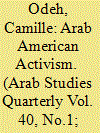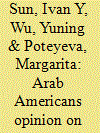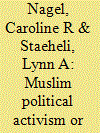|
|
|
Sort Order |
|
|
|
Items / Page
|
|
|
|
|
|
|
| Srl | Item |
| 1 |
ID:
161895


|
|
|
|
|
| Summary/Abstract |
This article provides a first-hand account of Arab American activism from the 1967 war to the present. It focuses on the development and activities of Arab Americans in the metropolitan Chicago area, with particular emphasis on the activities of Arab American and Arab students in the decades after the '67 war. It also describes the alliances forged between African Americans and Arab Americans during those tumultuous decades, as well as offering suggestions for what Arab American activists should do in the future.
|
|
|
|
|
|
|
|
|
|
|
|
|
|
|
|
| 2 |
ID:
106569


|
|
|
|
|
| Publication |
2011.
|
| Summary/Abstract |
While domestic and international terrorism have become the focal concern of the U.S. law enforcement and intelligence agencies, little is known about Arab Americans' attitudes toward counterterrorism policies that center on aggressive law enforcement practices. Using survey data collected from 810 Arab Americans, this study reported the general pattern of support for antiterrorism measures, including surveillance, stop and search, and detention, and examined the effects of race, ethnicity, and religion on measures targeting the U.S. citizens generally and Arab Americans specifically. The results revealed that the majority of Arab Americans showed weak to modest support for aggressive law enforcement practice, especially those targeting Arab Americans. Arab Americans' attitudes toward antiterrorism measures were significantly related to their ethnic identities and religion with those who identified themselves as Arab Americans and Muslim showing less favorable attitudes toward counterterrorism measures. Arab Americans' confidence in the federal government was also found to be positively associated with support for antiterrorism practices. Implications for research and policy are discussed.
|
|
|
|
|
|
|
|
|
|
|
|
|
|
|
|
| 3 |
ID:
147002


|
|
|
|
|
| Summary/Abstract |
This study investigated the relationship between self-reported discrimination and ethnic identity among 61 Arab American adolescents between the ages of 12 and 18 years. Participants completed the Multigroup Ethnic Identity Measure (MEIM) to obtain an assessment of their ethnic identities. Additionally, the lead author developed a questionnaire asking participants to self-report if either they or another Arab student they knew had been ‘treated badly or differently because of their ethnicity’. Consistent with the rejection-identification model, respondents who had reported experiencing discrimination, knowing of others who had experienced discrimination, or both had higher ethnic identity scores than those who had not, although the only significant difference was found between the group that experienced both types of discrimination and the non-discrimination group. Implications of these results are discussed as well as directions for future research.
|
|
|
|
|
|
|
|
|
|
|
|
|
|
|
|
| 4 |
ID:
113891


|
|
|
|
|
| Publication |
2011.
|
| Summary/Abstract |
Scholarship on Muslim political mobilisation in the West has developed as an important counterpoint to public discourse, which has tended to cast Muslims as a threat to social cohesion, liberal democracy, and national security. But even as scholarly literature has shed light on civic participation among Muslims, it has sidelined the diversity of political identities and values that motivate them. Most, if not all, Muslims in the West find their identities politicised in some way, but the question of whether this leads to a consensus amongst Muslims about the role of religion in public life often remains unexamined. In this article we draw on interviews with seventy-eight activists in Britain and the United States who are both Muslim and Arab to complicate ideas about the political mobilisation of Muslims in the West. Respondents, we show, are far from unified in their views on religion as a basis for political action and mobilisation. Some are keen to place Islam squarely in mainstream political spaces; most, however, are insistent that Islam should remain a private faith and identity and that political mobilisation should take place under the aegis of Arabness or other 'secular' identities. Using theoretical perspectives on the public sphere, we explain the complexity of our respondents' political identities and activism. Our overall aim is to broaden perspectives on the ways in which people from Muslim backgrounds participate in public, political life in Western contexts.
|
|
|
|
|
|
|
|
|
|
|
|
|
|
|
|
|
|
|
|
|